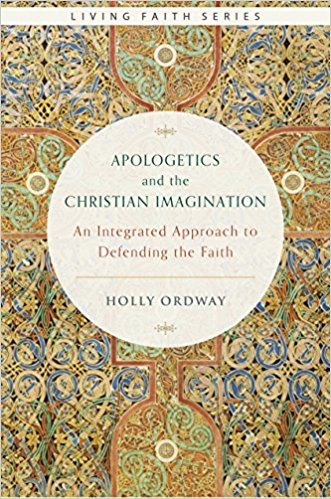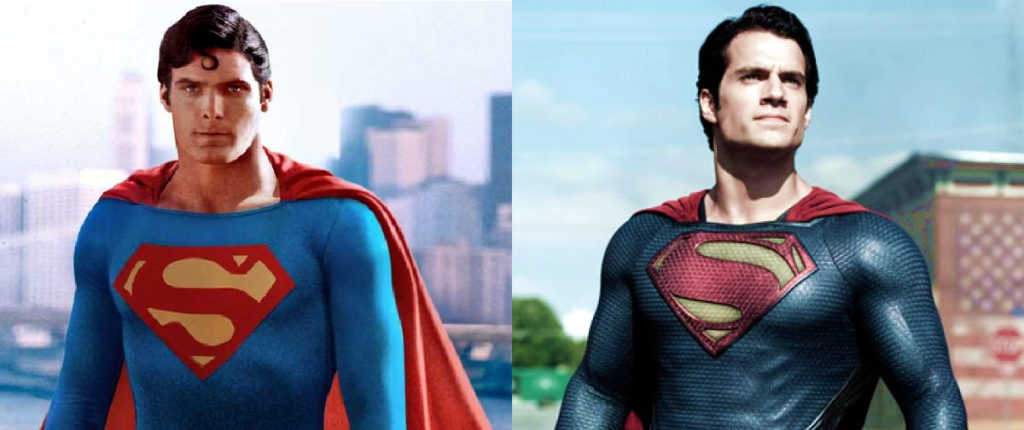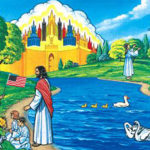Great Stories Can Help You Find A Greater Savior
As a Christian, I am used to being mocked by fellow Christians for finding eternal themes and redeeming values in genre books and graphic novels and films. As a geek, I’m used to being mocked for enjoying comic book characters. As a fan of reading books, I’m used to being mocked for liking fantasy and science fiction.
In short, as a Christian geek who reads, I’m used to being mocked for just about everything.
To be fair, I freely admit there are opportunities for questions. But if you look around, you may notice a healthy contingent of smart, devoted, effective Christians who are wild about genre works. What do we know that others don’t? I contend there’s something stirring at the heart of imaginative genre works which is not only worth a second look, but can be an effective tool in winning the souls of a jaded but thirsty generation.
By the time I was going to see movies on the big screen with my dad in the mid-1970s, the only superhero characters I’d seen in the cinema were in Batman: The Movie, a 72-minute version of the two-part episodes I’d already seen on TV. The main difference between the TV and cinema version that I could see was instead of dealing with one or two villains, Batman gave us the United Underworld, uniting four of the most iconic villains in Gotham City (The Joker, Penguin, The Riddler, and Catwoman). Seeing a comic book do-gooder on the big screen was a novel concept for me and it stirred my imagination. But that Batman was campy and mainstream and utterly safe.

But then, in 1978, Richard Donner’s Superman: The Movie changed everything. For the first time, I felt like my fascination and love for larger-than-life comic book protagonists was vindicated and celebrated. Christopher Reeve was personal hero, not just as a comic book champion, but as a representative for someone who bought into the values of Truth, Justice, and the American Way (which looked very much like the Judeo-Christian ethic to me). Superman is frequently described as “the big, blue Boy Scout,” a flying Jesus-figure. I thought we’d see more such films but the next big hits might be Tim Burton’s Batman in 1989, followed by Sam Raimi’s Spider-Man in 2002.
Fast-forward to today. By this time, we’ve had superhero films in one form or another for decades. What is it about the latest batch of superhero movies that’s so exciting? It is nothing less than the reach for ultimate meaning, trying to exceed mere escapist adventure and grasping for more transcendent truth.
The Marvel Cinematic Universe (MCU) is rife with examples of self-sacrifice on behalf of Mankind. The Marvel films featured a very reckless and self-absorbed Thor sacrificing the thing he loved most, himself, for Asgardian friends and lesser mortals. In the 1940s, Captain America literally gave up his life for his friends, and then he was treated to a stellar update in the modern era with the Captain America: The Winter Soldier. For my money, this was an example of masterful writing coupled with an idealistic soldier grappling as much with modern mores as sophisticated villains.
Marvel’s historic rival DC has been a little late to the game but for some of us, the superhero films in the DC Extended Universe (DCEU) have had a lofty beginning. E. Stephen Burnett summed it up best when he wrote:
The “battle for the soul” of true heroism is what the DCEU films always meant to explore. Who are good heroes, and why should they fight for a sinful world that does not deserve them.
This is heady stuff for superhero movies, but it doesn’t end there.
Mike Duran recently tackled the topic The Importance of Implicit (v. Explicit) Christian Content in Fiction where he described the two-step conversion C.S. Lewis took to faith, which included a strong assist from the Arts, specifically, reading fiction.
The first step in Lewis’ conversion was “a conversion to Theism, not to Christianity.” He moved from strict atheism to a belief in God. It was an inability to grasp certain doctrinal issues, namely the Atonement, that prevented Lewis from taking the next step and embracing Christianity. This changed when Lewis’ Imagination was engaged. Specifically his love for myth and how Christ was “the true Myth” or “Myth become flesh.”
 Duran quoted Holly Ordway’s book, Apologetics and the Christian Imagination:
Duran quoted Holly Ordway’s book, Apologetics and the Christian Imagination:
Ordway summarizes, “When Lewis realized that he could connect his imaginative response to the story, to the factual reality of the Christian claim about the Crucifixion and Resurrection, the final barrier to belief fell. He could become a Christian as a whole person, with both his imagination and his reason fully engaged.”
For modern non-believers, this assist from the Arts can occur through graphic novels, video games, music, movies. These modern superhero movies in particular have been rife with discussions of selflessness vs. selfishness, sacrificing one’s self for Mankind, “with great power comes great responsibility,” all that stuff. And this is why so many of us find fertile ground here to engage both our love of God and our love for geek culture. This is the power of redemptive storytelling which helps some take the first step toward ultimately embracing Jesus Christ. Superhero stories are one more tool in the Holy Spirit’s toolbox and it’s one we shouldn’t overlook, whether we are Christians, geeks, or readers.











































Hi Johne,
Interesting post. In contrast to you, I started out reading science fiction because I was as a kid an avid reader of science (especially astronomy and dinosaur books) and when I saw a section of books labeled “science fiction,” I wondered how science and fiction could meet.
My first book I grabbed by happenstance was the first novel Robert A. Heinlein wrote, Rocket Ship Galileo. While in a number of ways not a great story, it featured a rocket to the moon powered by a realistic atomic power plant. It stirred my imagination in ways the fantasy I had already been exposed to in Disney movies had not–because at least some elements of the story could really could come true. Yes, it really COULD happen that there could be atomic rockets flying to the moon (though nobody would find Nazis already there when they arrived, as happened in Rocket Ship Galileo).
Later I realized through C.S. Lewis’ “wood between the worlds” that fantasy as a genre can also claim to be something that could happen–in other created worlds, ones we know nothing about. I must admit that I find the idea a story could actually happen somehow in a parallel world much more exciting than a story that is just a story.
My first exposure to superhero stories was from a kid on the playground who was an avid comic reader. Like me, he had an avid imagination was willing to role play as a game. But he always wanted to pretend to be a doctrinaire superhero, one he had read about in a comic. Me, I would make up the kind of superhero I wanted to be on the spot, which upset my comic-book reader friend. NO–you had to be one of the established types, be it Batman, Superman, Flash, etc. etc. It wasn’t too long before I found him boring and his imagination curiously both stifled and stifling.
I think the first superhero movie I saw was the Superman of 1978 (I had seen the Batman TV show before that). I rather liked it. But Star Wars meant a lot more to me. And I had read through the James Blish novelizations of Star Trek and so I watched Star Trek: The Motion Picture with the kind of breathless awe the movie did not deserve on its own merits.
I have never been an avid comic book reader, though I have visited them from time to time. To me, comic books always seemed, even in the graphic novel versions that were supposed to be more adult, over muscled, over sexed, with unnatural dialogue, unrealistic plots, plots that also always revolved around some form of physical fighting. Though I never had any strong reaction against them–I just didn’t care for them much; they were not my cup of tea, but if somebody else liked them, I didn’t mind.
I have enjoyed comic book movies in the last decade far more than I ever liked comics. But let’s be honest–the reason why modern movies turned to the superhero genre for source material is now it is possible with modern special effects to produce the shots with real actors that were formerly only possible in drawings. And once the spectacle of people doing amazing things hit the screen, crowds came by the droves…so now the superhero craze is about making money for the studios.
These stories may show genuine good at times (though I think they also glorify evil at times), but the stories are rarely great stories. They are very simplistic stories, mostly, with few exceptions. And NONE of them match the standard of “maybe this could happen in another world” sort of thing. All of them do ridiculous things with physics, foreign languages, and history, among other errors. We suspend our disbelief because we want to see the show, but really, if an ordinary science fiction novel were written as badly as the average superhero movie, I wouldn’t enjoy reading it.
And furthermore, while I might want to live in a world with atomic rockets or talking animals, I definitely do NOT want to live in a world where superheros are real. Worlds with real superheroes are worlds with real supervillains and there isn’t much mere mortals can do about it, not always but usually. A world with superheroes is a world in which ordinary people are (mostly) helpless pawns. The only way a person can get around that unpleasantness is to identify himself or herself with the superhero, like my friend in the third grade used to do. But I mostly would not even want to be a superhero, either.
I see the modern superhero movie craze as being directed towards anything BUT great stories. Good stories often enough (definitely not always), but not great, not ever. Even in space opera, which is not my thing since I prefer more realistic science fiction, there have been some great stories, such has the Empire Strikes Back. Has there been even one superhero story that EVER rose to a level of achievement parallel to Empire? Not one, right? Not a single one. (Whereas plenty of science fiction movies have been truly great: Blade Runner, Gattaca, the first Matrix, and many others.)
I want to have an open discussion about the superhero movie genre. Is it good for the rest of speculative fiction? Is it bringing more fans into other forms of speculative fiction? Or is it drawing people away? Are these stories fundamentally moral? Or do they set up alternate moralities of dubious value? Or both?
In short, are these stories we should be cheering on–or should be be looking forward to the day the current superhero movie craze will come to an end?
I think it’s clear my face is looking at the superhero genre with a frown and a disapproving shake of the head. But that doesn’t mean I don’t want to talk out this issue. This should be a matter of discussion and consideration. Let’s not presume anything in advance.
I’m all ears for alternate points of view. 🙂
I agree that superhero stories can be another tool. Of course, God can use anything to plant seeds in people’s hearts but the power of story is an amazing one that He used Himself with His parables. Superman Returns is my favorite of the superhero movies because there is so much powerful imagery.
(Though I’ll admit I’m starting to get tired at the onslaught of comic movies recently. There have been several gems but some real let-downs too.)